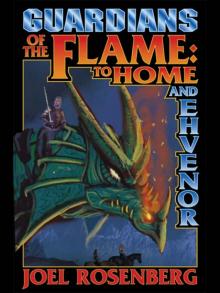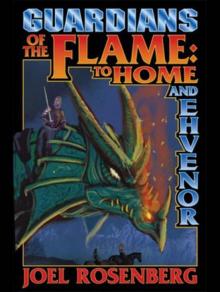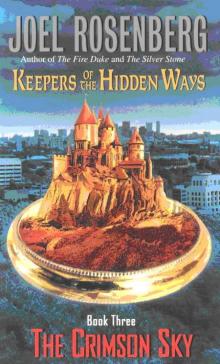- Home
- Joel Rosenberg
The Crimson Sky Page 2
The Crimson Sky Read online
Page 2
He spun around, quickly, his weight on the balls of his feet, not sliding at all, despite the slipperiness of the sidewalk.
The middle-aged woman in the heavy coat, weighed down with the canvas Byerly’s bags, let out a gasp, her eyes wide, and dropped one of the bags.
Paper-wrapped packages of meat fell to the sidewalk, cans rolled into the snow, and the small glass bottle of Crystal hot sauce bounced once, twice, three times on the ice before deciding not to break after all. Which was just as well. Torrie would have had to offer to pay for it, and this being the city, that would have been awkward.
“I’m sorry,” he said, bending over to help her put the groceries back. “I thought I heard something, and I kind of, I don’t know, I kind of twitched.”
“That was different,” she said, her mouth twisting into a smile.
He brushed snow and grit off the bottle of Crystal sauce and put it back in her bag.
“Can I carry one of these for you?” he asked, reflexively, then flinched. You just didn’t do that in the city.
But surprisingly, she nodded. “Sure—you bet.” She smiled knowingly as she handed him one of the gray canvas bags. “You can take the boy out of the country, but not the country out of the boy, eh?”
“It shows, does it?” He slung both of his bags over his left shoulder and kept step with her.
“Well, yes, it does.” She smiled again. “But it’s very sweet.” She took the small, sort of mincing steps that old people did when they walked on a slippery surface, but at least she took them quickly enough that he didn’t have to slow down too much. “Whereabouts are you from?”
“Hardwood, North Dakota.”
She frowned, as though she had expected the name to be familiar.
Lady, it could have been famous, but we like things the way they are, thank you very much.
Hell, even Hatton, with half the population, had its famous native son in Carl Ben Eilsen, an early barnstormer, but nobody famous had ever come from Hardwood. Which was fine, really, and the way it should be, although there were times and ways in which that grated on Torrie’s nerves.
“Hmmm … no, I guess I never heard of it,” she said. “I’ve got an uncle who lives in Bismarck—is it anywhere near there?”‘
He shook his head. “No. Other side of the state, about forty miles out of Grand Forks.”
“Ah: East Dakota.” She nodded. “That’s what my uncle Ralph always used to say, that the Dakotas were divided the wrong way. That they should have been East and West instead of North and South.”
Torrie had never thought of that before, but it did make sense, sure—the west was badlands and mountains, the east was flat farmland. “There’d be some sense to that.”
“Yup. So, do you like the city?”
“Well, it has its points.”
“But you miss Hardfield.”
“Hardwood. And, yes, actually I do.” Minneapolis was a nice enough city, as cities went. But it was a city—it was filled to overflowing with strangers.
“I see.” She gave him a grin that told him she thought she knew what he was thinking, and she probably did. “Didn’t anyone ever tell you that you can’t ever go home again?”
“Well, yes, I have heard that, actually.” But you didn’t need to believe everything you heard, after all. Torrie would have shrugged, but that would have made his gear bag slide off his shoulder, and he didn’t want that.
What he did want to do was to ask how much further she was going, and that was awkward.
Not that he wouldn’t carry the bag wherever it was (and it couldn’t be far enough for it to be a problem for him, or she wouldn’t be carrying so much—it wasn’t like she was a young woman—she was at least forty, forty-five); he just wanted to know.
But this was the city, and you didn’t ask a woman where she lived, for fear she’d think you’d be lurking outside around her house all night, baying at the moon or something.
He was thinking about the right way to ask how far away her place was without asking where it was when she turned left at the camera store onto Bryant Avenue.
He wouldn’t have been very surprised if she had climbed up the steps to the fourplex where Maggie lived—he didn’t really know any of Maggie’s neighbors; this was the city, after all—but she gestured at the next building down, and reached out her hand for the bag.
“Thank you for your help, but I think I can take it from here,” she said.
He had lived in the city long enough to know that she meant I’d rather you not walk up to my door, and that that wasn’t just a figure of speech meaning Can you carry the bag all the way into the house? as it would have been at home, and he was only very slightly surprised when he noticed that she had a little blue pepper-spray canister on her keyring, which was already in her hand, and probably had been in her hand all the while they were walking and talking together.
Well, good for her, he thought, as she walked up the stairs, glancing once over her shoulder to make sure he was moving away.
Which he was.
It made him feel funny. No, not funny: bad. Shit, a woman didn’t need pepper spray—or a knife or a gun or a squad of cops, for that matter—to prevent Torrie Thorsen from committing robbery or God-knows-what, and it hurt to think that that didn’t show on his face.
No. That wasn’t fair, and Torrie tried to be fair, even in the privacy of his own mind.
Ted Bundy had looked like the clean, all-American boy, too. And the city wasn’t the country. You could pretend it was, if you were foolish enough. You could leave your car or your room unlocked, or not worry about what time of night it was when you went out, or assume that any footsteps behind you were somebody you knew, and you—
And you would be burglarized, mugged, robbed, and murdered, more than likely more than once.
He grinned.
Except for the murdered part, of course.
He had keys both to the outside door and to Maggie’s front door, but he rang the bell instead. Her roommate had a habit of walking around with what Torrie thought of as insufficient clothes, and that embarrassed him when he came upon it suddenly.
It wasn’t like she looked all that good in just panties and bra, either.
The wind picked up, driving the cold into him, as he waited, reconsidering digging into his pockets for the keys. A quick beep could have meant Throw on some clothes, I’m on my way up, after all.
And then there was that smell again. Still distant, but bitter and acrid and harsh, and … what was it? It was familiar, and it almost had the hairs on the back of his neck sticking up, but—
He just couldn’t place it. Damn.
He was still considering when he heard her feet thumping on the stairs.
Maryanne Christensen opened the inner door as he opened the outer one. Her hair was up in some sort of complicated ponytail type thing that left the back of her slim neck bare, and her face was slightly flushed at the cheekbones.
“Come in, come in,” Maggie said, then turned and headed back up the stairs. He didn’t blame her for hurrying. The hallway was unheated—the landlord never turned on the hall radiators, apparently—and she was dressed only in black leggings and a long, loose red silk shirt they had picked up off the Bois de Bologne.
He enjoyed the view as she moved quickly back up the stairs, taking each step with a bounce. Some would have thought her too skinny, but she was built along what his mother would have called greyhound lines, and while her muscles didn’t bulge, a pleasant combination of heredity and exercise had given them a tone that made her worth watching from just about any angle.
Certainly including from behind.
If she’d caught him staring, she would have glared, the way she had at Ian that one time. Ian had just smiled and said, “Hey, I like girls. Sue me.” And Maggie had decided to take that with a smile.
Hey, if she didn’t want to be looked at, she could dress ugly.
“I was starting to worry,” she said. “I thought you said y
ou’d be here around one.”
“Well, I did say ‘around’ ” He glanced at his watch—2:17, it said; he was later than he’d thought—as he followed her down the open hallway to her open door. Maybe he should have some words with her about answering the door with pepper spray in hand. It was the city, after all.
“I took a little longer at the library than I thought I would,” and never mind that part of the time was spent chatting with the new assistant in the reference department, who wanted to know what the fencing gear case was about, and who, underneath a remarkably long set of lashes, had a pair of very large and very brown eyes that a guy could enjoy spending a few minutes looking into, “and then I decided to take the bus instead of digging my car out.”
“Well, good,” she said, taking his bags and coat, then unceremoniously tossing them onto the couch in front of the spool table. “Long as you’re here, you can give me a hand with this for a few minutes. It’s not a rush, but I need to have it taken apart in two weeks.”
The apartment was built along standard South Minneapolis railroad-car lines: one long room, cut in half by a craftsman-style built-in mirrored buffet that Torrie had identified as Stickley, the kitchen built into the hall that opened on the bedrooms, beyond where the buffet stood as the outer wall to Maggie’s room.
The buffet, though, was partly disassembled, the drawers stacked to one side, its joints and innards lying exposed, as though it were some wooden creature, disembowled by somebody in a rush.
“That’s new,” he said.
She nodded. “My landlord offered me a break on the rent if I refinish the built-in.”
Torrie raised an eyebrow.
She smiled. “And your uncle Hosea offered to come down for a week and do the stripping and refinishing and rebuilding for me, when I called him to ask for some advice, and maybe some help.”
Torrie smiled. “Just don’t let him go wild with abditories.”
“Eh?”
“Nothing. Never mind.”
It was the sort of piece Uncle Hosea would love to put hidden hiding places in. This buffet was similar enough to the one in the Guest Room at home to receive the same treatment: a silent little pressure lock hidden beneath each of the door hinges, holding a drop-down compartment in place. Put a piece of paper inside each of the hinges, press the two glass-paneled doors shut hard enough to make the hinge-plates flex just enough to set the pins correctly in the keyway, then slide open the top drawer—just soooo far, and no farther—before a quick thump on the top of the buffet, and a two-inch-thick inner drawer would drop down.
That abditory, the one in the buffet at home, contained a set of spare passports and other papers that might be useful under extraordinary circumstances. Other abditories, like the compartment under the front hall stairway, contained survival kits, or weapons, or money, or things as prosaic as the emergency roll of toilet paper.
But Uncle Hosea often built such things just as an art form, like the tiny one in Mom’s bathroom for her tampons, which Torrie had only found accidentally, while clearing hair out of the sink’s trap. And back when Torrie was a kid, Uncle Hosea had built him a secret compartment in the side of his closet that was just the perfect size for a stack of Playboys.
Giving Uncle Hosea a week to put this buffet back together was like locking a kid up in Toys “R” Us for a night.
Well, let him have his fun.
She gestured at the tools spread out on the canvas drop cloth covering the floor. “All I have to do is take it apart without doing much damage, and I can do that.”
“I did have other ideas as to how to spend the afternoon,” he said, reaching for her.
“You did, did you?” She grinned as she wrapped her arms around his waist. “Hmm … well, it appears you did. I think we ought to do work, food, and some studying first. We’ve got the place to ourselves—Deb’s spending the next couple of nights over at Brian’s, and I’d be surprised if she even stops by to pick up her mail. So, what would you think about us doing some grunt work, then some studying, then grabbing a quick supper and see what happens after that?”
“Is that one of them there rhetorical questions?”
“Yup.”
“I never liked rhetorical questions.”
“Work first; then food. And then, well, maybe we’ll see. You work better when you’re horny.” Her smile turned her maybe into a promise, and a quick kiss sealed it.
“I think my good nature is being taken advantage of,” he said as she stepped back. He dropped his jacket and then opened up the toolbox, giving in with as much grace as he could muster, which wasn’t much.
“Work.”
He made a low rumble in his throat.
“Don’t growl.”
“Sorry.”
He didn’t like it, but he didn’t have to. But still, shit, Maggie didn’t need to get a break in the rent. She didn’t need to have a roommate. She could have afforded the apartment all by herself. And even if she couldn’t, she did have a boyfriend who could have and would have picked up the rent without worrying about it.
Torrie sighed. He’d just as soon pay the rent—no, he’d rather have paid the rent on a place closer to campus, for the two of them.
But no. No, it wasn’t about money. Maggie’s parents were taking care of her rent and tuition, and Torrie’s mom had invested Maggie’s share of their Dominion gold for her. It wouldn’t make her rich, but it would take care of rent and food and such indefinitely, if needed.
It wasn’t about money. Most things about money weren’t really about money—Torrie had learned that from Ian Silverstein.
For Maggie, this was about doing things the right way, and it was important to her to do things the right way. Apartments near the U were undersized, and the ones that had any character at all were hideously overpriced. So she had arranged her class schedule to pack her classes close together, and had looked over in South Minneapolis, near the bus line.
Two-bedroom apartments tended to have decent-sized kitchens and living rooms, and rented for significantly less than twice as much as one-bedroom ones.
And if you had a two-bedroom apartment, not renting out the second bedroom would simply be wasteful, and renting it to your boyfriend—who could afford it even more easily than you could—would smack of him picking up your rent, and that was where this whole thought started, with Maggie not being willing to let him do that, because it wasn’t about money.
Damn.
The nice thing about money was that that MacKay guy—Harry? Ralph? The guy who owned that envelope company and gave all those speeches—was right about it. If you had a problem that you could solve—not put off, but solve—by writing a check, you didn’t have a problem.
All you had was an expense.
“Don’t pout,” she said. “You look about ten years old when you pout.” She came into his arms for a quick kiss, hesitating for a moment before her lips parted and her tongue was warm in his mouth. His left hand cupped her bottom, pulling her toward him, while his right sought her breast.
But she pushed him away.
“Later,” she said. “Maybe.” She smiled as she stroked a finger down the front of his zipper. “Delayed gratification is the best kind.”
Well, there were times when no didn’t mean no, but this wasn’t one of them.
Damn. I should have stopped at the Greek place. A Cheeseburgeropoulis would go down well, right about now. And it was looking like food would be about the only goddamn thing that would be going down in the near future.
“Coffee?” she asked.
“Fresh pot.” He sniffed. Yes, that was good, rich, dark-roasted coffee, and it wiped out any trace of that strange scent in the air.
What had that been? It was familiar, and disquieting, but he couldn’t place it.
He sighed, and reached for a chisel.
Chapter Two
The Hidden Way
Ian Silverstein shrugged into his parka and stepped into his boots, then bent to lace them
up the front. He was still enough of the city kid that it felt strange to be wearing boots that you wore instead of, rather than over, your shoes, but going around in your stocking feet wasn’t an embarrassment in Hardwood anywhere that was too nice to wear snowy boots.
Hell, he had a cheap pair of Chinese slippers in one of the pockets of his parka, but he’d never found the occasion to use them, and he was thinking about taking them out and putting them in permanent storage in the closet. He couldn’t wear them around the house, after all, not if anybody came over—it would make it look as though he expected everybody else to do the same.
Boots laced, he opened both the heavy wooden front door and the storm door to take a quick sniff of the frosty air, shivering at the almost arctic blast that answered him.
Hmm … maybe he should put up one of those outside thermometers.
But sniffing the air was the way that everybody in Hardwood seemed to decide how many layers to put on, and that was the way Arnie Selmo had always done it, and that was the way Ian would do it, too.
It was probably silly, but it was part of feeling like he belonged here.
He looked around the room to make sure he had shut off the lights. That was another small-town thing he was getting used to: you shut off the inside lights when you went out, perhaps leaving the porch light on to light your way back in, but not leaving on lights and a TV or a radio to dissuade burglars. That was wasteful.
He had made changes around the house, as a friend had suggested and as Arnie had given permission, but each change, no matter how minor, had been deliberate and calculated, something he could justify to Arnie, and something that, through some strange coincidence, just happened to remove yet another reminder of Ephie Selmo.
The wall between the kitchen and the living room had held Ephie’s knickknack shelves, so he and Thorian Thorsen had knocked down the wall when they redid the kitchen, dining room, and living room all into one very homey sort of room, half carpeted, half tiled, the two sections separated by a counter that stood where the wall had been. You could cook dinner and chat at the same time, or stretch out on the battered old couch with a newspaper and a cup of coffee while keeping an eye on a simmering pot of soup.

 The Road Home
The Road Home The Sword and the Chain
The Sword and the Chain Not Quite Scaramouche
Not Quite Scaramouche Guardians of The Flame: To Home And Ehvenor (The Guardians of the Flame #06-07)
Guardians of The Flame: To Home And Ehvenor (The Guardians of the Flame #06-07) The Silver Stone
The Silver Stone Hero
Hero Not For Glory
Not For Glory The Sleeping Dragon
The Sleeping Dragon The Fire Duke
The Fire Duke Guardians of The Flame: To Home And Ehvenor (Guardians of the Flame #06-07)
Guardians of The Flame: To Home And Ehvenor (Guardians of the Flame #06-07) Hour of the Octopus
Hour of the Octopus Emile and the Dutchman
Emile and the Dutchman The Crimson Sky
The Crimson Sky Guardians of the Flame - Legacy
Guardians of the Flame - Legacy The Silver Crown
The Silver Crown Not Exactly The Three Musketeers
Not Exactly The Three Musketeers Not Really the Prisoner of Zenda
Not Really the Prisoner of Zenda